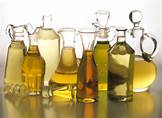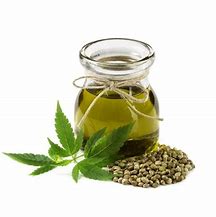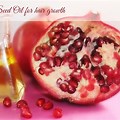Definitions and Terminology - Vegetable Oils





-
Definitions and Terminology - Vegetable Oils
- Vegetable oils constitute the bulk of the mix used to perform an aromatherapy massage. Their function is to 'carry' or act as a vehicle for administering the essential oils to the body, hence the term 'carrier oil'. They act as a lubricant, making it possible to carry out massage movements. all carrier oils are emollient, to a greater or lesser degree.
- Basic Vegetable Oils
Sweet almond, apricot kernel, grapeseed, peach kernel and sunflower are amongst the most common carrier oils, and can be used with or without essential oils for straightforward body massage. They are generally pale in colour, not too thick and have very little smell, unless the seeds or nuts have been roasted first to produce flavourful cooking oils. - Special vegetable Oils
Certain vegetable oils tend to be more viscous and heavier than basic ones, and can be rather expensive. These include avocado,olive, sesame, rosehip and wheat germ. - The really rich oils such as avocado and wheatgerm are seldom, if ever used, on their own. It is more usual to add 10-25% of these two to 75% of basic carrier oil.
- Macerated Oils
Macerated oils have additional properties to all the vegetable oils described above because of the way they are produced. Particular parts of certain plants are chopped up and added to a selected carrier oil ( usually sunflower or olive 0 and the mix is agitated gently for some time before placing in strong sunlight for several days . all of the oil-soluble compounds present in the plant material (including the essential oil-soluble chemicals ) are transferred to the carrier oil, which consequently contains extra therapeutic properties . The macerated mixture is then filtered carefully to remove all the added plant material. - Organic Vegetable Oils
Strictly speaking, organic oils can only be produced from organically grown plant material using approved processes, and it is not easy to find reliable sources of such oils. In practice the word organic may be applied either to raw material or to the production process. - For example, an oil may be derived from organically grown seeds by a non-organic process or, as can often happen (because it is not always easy to find organically grown seeds), non-organic seeds may be converted into oil by organic production methods.
- The rules for organic processing generally exclude the use of chemicals, and a truly organic fixed oil is obtained only from plants which are both organically grown and organically processed. As the rules for organic growing and production of vegetable oils vary from country to country ( and in some cases are non-existent), it can be a difficult task to source a particular quality of oil.
- Production of Fixed Vegetable Oils
The production of commercial oils may start with crude imported oil but the best quality oil is derived directly from the nuts and seeds. as with essential oils , many factors have an important influence on the finished product: Obtaining the highest quality raw material is vital.
Time of harvesting
Conditions of storage
Method of extraction
Means of transportation- Often it is preferable to store the raw materials rather than the finished oil, as the seeds contain their own natural antioxidants and have tougher outer coatings for further protection against oxidation. If there should be any undesirable products formed during storage these would normally be passed into the oil cake by-product, leaving the oil free of any such materials.
- Clearly, oils derived from the kernels of fruits, eg almonds and peaches, are more protected from drifting chemical sprays and pollution than are the more exposed seeds such as corn and sunflower.
- Cold Pressed Oils
cold pressed vegetable oils are the best and are generally more superior to those found in supermarkets. In the 'cold' pressing process, excessive heat is avoided in order to minimise changes to the natural characteristics of the oil. Traditionally, there are two methods of cold pressing. In one, the raw material (seeds, nuts or kernels0 is simply pressed with a hydraulic press and the oil is squeezed out. This process is only used for soft oily seeds and plant material such as olive, sesame and sunflower. - Cold Pressed Oils
cold pressed vegetable oils are the best and are generally more superior to those found in supermarkets. In the 'cold' pressing process, excessive heat is avoided in order to minimise changes to the natural characteristics of the oil. - Traditionally, there are two methods of cold pressing. In one, the raw material (seeds, nuts or kernels0 is simply pressed with a hydraulic press and the oil is squeezed out. This process is only used for soft oily seeds and plant material such as olive, sesame and sunflower.
- Harder seeds, such as safflower, require more force and a large, powerful screw device known as an expeller is used to crush the plant material, which may be passed through the expeller more than once. The process generates a certain amount of heat and in France a legal temperature limit of 69C is applied to oils that are classed as cold pressed.
- There is not an equivalent limit in the Un ited Kingdom. Some specialist suppliers may be able to offer oils that have been expressed at temperatures below 45C but these will command a premium price as usually less oil is obtained.
- The crushed shells, etc are removed from the oil by a succession of filters, the last of which is made of paper. The oil obtained is usually clear (avocado is an exception as it is usually cloudy, especially in cold conditions) and has its taste and nutritional properties intact. The vegetable pulp that remains still contains a reasonable amount of oil and is either used for animal feed or sent to another factory for further processing. Here it will all be subjected to a high temperature, high pressure process, or it may be treated with steam and solvents. The oils obtained from such additional processing are not ideal for aromatherapy massage.
- Reference: Carrier oils for Aromatherapy and Massage Price with Ian Smith and Shirley Price.
Articles-Most Read
- Home
- Contact Us
- Coconut Oil-2
- Absorption Ratings for Carrier Oils
- Cold Pressing Method
- What are Essential Fatty Acids
- Cherry Kernel Oil
- Fixed Oils and Skin Penetration
- Hempseed Oil
- Almond Oil
- Cocoa butter
- Camelina Oil
- Antibacterial Effects Of Carrier Oil
- Coconut Oil
- Lime Blossom Oil (macerated)
- Carrot Oil, Wild Carrot Oil (macerated)
- Apricot Kernel Oil
- Kukui Nut Oil
- Jojoba Wax
- Pumkin Seed Oil - Cucurbita maxima, C. pepo
- Passion Flower OIl (Macerated)
- Hydrocotyle Oil (macerated)
- Palm Kernel Oil
- Rapeseed Oil - Carrier Oil
- Nutrients
Who's On Line
We have 40 guests and no members online
Articles-Latest
- How to Make Homemade Olive Oil: A Step-by-Step Guide
- 20 Evidence-Based Aloe Vera Oil Benefits For Skin, Hair & Health
- Peanut oil - Cold pressed - Are There Health Benefits? How To Make
- What Are the Health Benefits of Black Seed Oil?
- Comfrey oil Infused
- Chamomile Flowers Infused Oil
- Calendula Flowers Infused Oil
- Arnica Flowers Infused Oil
- How To Make Herb-Infused Oils
- DIY avocado oil for healthy skin
- How To Make Coconut Oil
- 8 Benefits of Mustard Oil, Plus How to Use It
- SHOREA STENOPTERA SEED BUTTER
- Shea Butter- 7 Amazing Benefits Of Shea Butter
- Monoi Oil For Hair & Skin
- Mango Seed Oil
- Cohune Oil Is The Next Big Thing
- Brazil Nut OIl
- 7 Impressive Benefits Of Allspice
- Camelina Oil Benefits, Uses, and Side Effects




